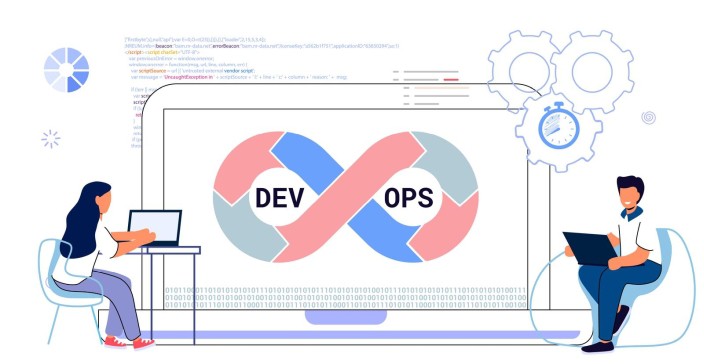Azure DevOps is a key element of the developer community, especially those who work with Microsoft. This is why a lot of eyebrows were raised when Microsoft purchased rival company GitHub. This sparked a lot of concern that they might be expected to transition to this new platform. So, is Azure DevOps going to be discontinued?
It’s unlikely that Azure DevOps is going away in short to medium-term. It remains an integral part of the development community. GitHub, which is expected to replace Azure DevOps eventually, still lacks key features. Plus, Microsoft continues to plan and implement regular updates to the platform.
Many customers have gotten used to using Azure DevOps. The good news is that transitioning to GitHub will take Microsoft a long time. So, you’ll be able to continue using this platform for many years. Read on to learn more about the future of Azure DevOps.
What Is Azure DevOps?

Azure DevOps is a platform this is used for creating and deploying software. It is best known for being used by large enterprises. It is primarily known for being used for closed-source developments. It has a wide range of features, including thousands of extensions.
Azure DevOps is designed to help teams write and deploy new applications. It has become popular because it’s easy to set up and use.
Several features attract people to this platform. These include:
- Makes collaboration easy. This tool was created with managers in mind, so there are plenty of tools that make it easier to lead a team. For example, there are team dashboards to track progress and built-in wikis to help team members share information.
- Uses Agile tools. These tools allow you to track the project. For example, you can use a Kanban board to monitor and fix coding issues.
- Testing tools. This allows you to find errors within your code before it goes live.
- Multiple extensions. Because Microsoft owns it, users can access many popular extensions. This includes things like Campfire and Slack.
There are two types of Azure DevOps that businesses can explore, depending on their needs. These are:
- DevOps Services. This is run through the cloud, which allows for an easy setup. This is the approach that smaller organizations use.
- DevOps Servers. These are run through a server that is located in your organization. This allows you to store the data within your private network. Larger organizations often use this.
What Is GitHub?

GitHub is an open-source software development platform known for its large code repository. It has a large community of developers and encourages collaboration. There are many other innovative tools, like scanning code for mistakes and helping managers track project progress.
Now that you know what Azure DevOps is, let’s take a brief look at what GitHub offers and what makes it different. The name comes from the word Git. This term is widely used within the coding community and refers to the code versioning system. The Hub aspect refers to the repository where the code is stored.
One of the biggest differences between the two platforms is that GitHub is free for open source. As a result, developers can make their code available to the community. Then, as a group, they can work together to improve it. This approach can also be used within an organization, encouraging collaboration.
There are a few other features that make GitHub stand out:
- Tracking project changes. It will be easy for managers to see what changes were made to the project and by whom.
- Social networking aspect. GitHub has a strong online community, which Azure DevOps hasn’t been able to foster.
- Collaboration tools. There are elements like a task management system and a wiki to ensure that everyone working on the project is kept on the same page.
- Forking. Users can copy code from one user to another. This creates a fork, allowing them to modify the fork without impacting the original code.
- Pull requests and merging. Once the code has been updated, they can send a pull request to the owner of the original code. If they like the changes, they can merge the new and existing code together.
Now that you know a little more about these platforms, let’s take a closer look at their parent company Microsoft and see what the future holds for Azure DevOps.
Why Did Microsoft Buy GitHub?
One of the biggest factors that motivated this sale was the sizable developer network that GitHub was able to create. Additionally, Microsoft is putting more value on open-source code, and GitHub has a large community repository. GitHub has also shown a way to generate profit.
In 2018, Microsoft paid a whopping $7.5 billion to purchase GitHub. Interestingly, this decision wasn’t based on the potential profits that GitHub could provide. It was designed to allow them to access the thriving developer community that uses the platform.
To understand why this is so valuable, you just have to look at the number of people who use this site. Here are some stats about GitHub:
- 73 million developers use it
- Thousands of businesses use GitHub
- 61 million repositories were created in the last year alone
- 84 percent of Fortune 500 companies used GitHub
By purchasing a resource like this, Microsoft hopes to cement itself as the go-to location for developers.
Another key reason for the acquisition was to focus more on developing open-source code. This is becoming more popular within the community and is one of the biggest features that GitHub has to offer.
A third reason is that they had already established a way of commercializing the platform through paid tiers. As a result, Microsoft would have recognized the chance to improve its bottom line.
Is Azure DevOps Going Away?
This brings us to the Azure DevOps, the existing development platform, and the impact the acquisition will have on it. In the short term, the answer is there won’t be any impact on Azure DevOps. There are at least 4 reasons why Azure DevOps is likely to continue to stick around for a decade or longer.
#1 Azure DevOps Remains Popular With Developers
Azure DevOps has been around, in one form or another, for a long time. Because of this, it has built a large fanbase of developers. Many of them are locked into this system. If Microsoft attempts to move to a new system too quickly, it will upset many organizations.
Because of this, Azure DevOps will likely continue to be used for many years. This is why Azure DevOps and GitHub currently co-exist, rather than trying to rush a transition to GitHub.
#2 Microsoft Still Has A Lot of Source Code On Azure DevOps
Microsoft needs to consider not just the thousands of enterprise customers that use Azure DevOps. Their team also has a lot of code that relies on Azure DevOps, which they used for years to build their products. The clear majority of Microsoft programs rely on Azure DevOps.
Transitioning to a new development planning is a huge change. If Microsoft were to take this approach, it would take several years to finish this task.
#3 GitHub Lacks Features
GitHub might be hugely popular, but it doesn’t have the same features as Azure DevOps. Azure is a more mature platform, so it has had more time to refine its tools. Plus, Microsoft developed it, making it easier to integrate directly into Windows products.
Some of the things that it is missing include:
- Lack of support for Agile development
- It doesn’t support scale support agents
- Azure DevOps has a better range of lifecycle management tools
A lot of these features will likely be integrated into Azure DevOps. However, it will take time for Microsoft’s team to finish this process.
#4 Development Continues On Azure DevOps
Another reason why you shouldn’t expect Azure DevOps to shut down any time soon is that Microsoft is committed to making upgrades to this platform. Here are some of the upgrades they expect to make over the coming months:
- Associating public APIs with PAT scopes
- Permitting users to make read-only comments
- Allowing auditing services for all customers
- Incorporating GitHub Enterprise into Azure Pipelines
This pipeline of projects will likely take a few years to complete. It’s unlikely that Microsoft would be spending so much time and money on Azure DevOps if they had any intention of shutting it down soon.
What Is Microsoft’s Plan For Azure DevOps?
Microsoft hasn’t confirmed any official plans for the long-term future of Azure DevOps. Many have speculated that it will be phased out and replaced by GitHub. However, it will likely be several years before Azure DevOps is discontinued if this is the case.
Since Microsoft acquired it in 2018, many people have been confused about whether Azure DevOps and GitHub could co-exist over the long term. However, as the world and the company start to embrace open-source programming, it would make sense for them to keep GitHub and discontinue Azure DevOps.
However, these plans haven’t yet been confirmed by the company. Much of what is known about the future is based on rumors and speculation. It’s possible that the company might be happy with having two development platforms, at least for the short to medium-term.
For example, we can consider their 2016 acquisition of LinkedIn. It cost them $21.6 billion. But since the purchase, they have been happy to play the long game. They’ve focused on building the user base of LinkedIn before trying to incorporate Microsoft software.
If they are taking the same patient process with GitHub, it could be many years before they try to incorporate it into Azure DevOps or shut down Azure DevOps in favor of GitHub. With few changes since 2018, developers can rest assured that they’ll get plenty of time to adjust to whatever direction the company decides to take.
Azure DevOps Vs. GitHub: Which One To Choose?

Azure DevOps tends to be used by enterprise customers. This is because it’s a more mature option with a wider range of integrations and features. On the other hand, GitHub has fostered a large open-source community and has become known for its large code repository.
Both Azure DevOps and GitHub are valuable tools. Both can be used to streamline the development process. However, though they might look similar, there are some key differences when deciding which one you should use.
Primary Customers
There is a slight difference between the primary demographic each development platform is targeting. Due to its long history, Azure DevOps is used by many enterprises and businesses. However, GitHub has become more popular with the general developer community.
It should be noted that GitHub has fostered a large network of developers willing to work together to improve code. On Azure DevOps, you’re often limited to the developers within your organization.
Open-Source Approach
Azure DevOps has started to develop a more open-source approach. But if you prefer to work within an open-source environment, GitHub is the best option. In addition, Microsoft itself prefers to use GitHub for most of its open-source needs.
Both will provide a private repository if your organization wants to control access to proprietary tech.
Hosting A Code Repository
Both sites allow you to host a code repository. But it’s generally agreed that the best site to do this is GitHub. This makes creating and accessing this repository a lot easier.
Project Management
In this area, Azure DevOps is the best. It has plenty of features designed to make leading your team as easy as possible. Some of the key advantages include:
- Thousands of extensions
- Pipeline management is easy
- More features than GitHub
You’ll be able to access GitHub from the Azure DevOps platform easily. But if you want to manage a project on GitHub, you’ll be limited to this platform.
What Are Other Alternatives To Azure DevOps?
While Microsoft hasn’t said they would discontinue this platform, many developers are still wary about starting any long-term projects on it. Because of this, they are looking for alternative platforms to explore. Here are some of the options you can consider:
- GitHub. As we’ve mentioned, the two platforms are very similar.
- Copado CI/CD. While this might be more expensive than Azure DevOps, it will be easier to use.
- AWS CodePipeline. This is provided by Amazon and is designed to make it easier to perform reliable updates. They have better support, though they are more costly.
- Google CloudBuild. This option might be a bit easier to use than Azure DevOps.
- CloudBees CI. It has great support and will allow your business to respond quickly to changes in software needs.
What To Do If You Already Use Azure DevOps?
Those who are currently using Azure DevOps can choose to stick with the platform. Though there hasn’t been an official announcement, it’s likely that Microsoft won’t even consider shutting it down for a few years. Alternatively, they can start pre-emptively moving their code to GitHub.
If you already have Azure DevOps, you have two options. You can either stick with Azure DevOps or migrate to GitHub. Let’s examine these choices.
Continue Using Azure DevOps
First, you can continue using Azure DevOps as you usually would. There has been no indication that Microsoft is planning to discontinue this platform. They have also not made any announcements about the platform’s future.
Because of this, you should be able to continue using it for your business. If they do decide to discontinue the platform, you should have plenty of time to transfer your code. Remember, it will likely take several years before they even consider shutting down Azure DevOps.
Transfer Your Project to GitHub
The second option is to start transferring your projects to GitHub, or an alternative platform, now. This has become a lot easier. You should be able to move your code from Azure DevOps to GitHub seamlessly.
It’s also important to remember that the features on GitHub aren’t as advanced as those on Azure DevOps. Though this issue is likely to be fixed in the future.
Starting A New Project on GitHub
If you haven’t started using Azure DevOps, you might consider starting your project on GitHub. Then, if Microsoft does decide to shut down Azure DevOps, you won’t have to transfer files from one platform to another. Plus, GitHub has a good selection of features and tools, so you shouldn’t have to turn to Azure DevOps.
Conclusion
Ever since Microsoft purchased GitHub in 2018, developers have been concerned about the future of Azure DevOps. However, four years later, Azure DevOps is still running and getting regular updates.
Though developers can’t be certain about Microsoft’s long-term plans, Azure DevOps will likely be with us for several years.
